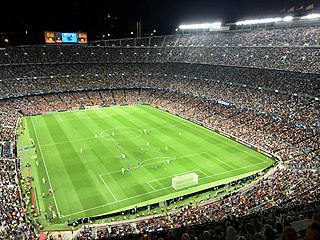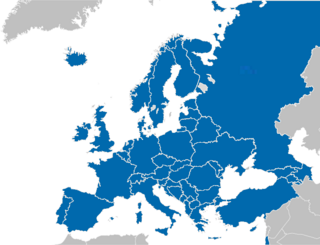The Biathlon World Cup is a top-level biathlon season-long competition series. It has been held since the winter seasons of 1977–78 for men and 1982–83 for women. The women's seasons until 1986–87 season were called the European Cup, although participation was not restricted to Europeans.
Sportin Latvia includes basketball, football, ice hockey, athletics (track), rugby, tennis, cycling, and others. Ice hockey is the most popular of the Latvian sports and is closely followed by basketball. Some of Latvia's most notable athletes include hockey player Sandis Ozoliņš, football player Māris Verpakovskis, Olympic javelin thrower Jānis Lūsis, two-time Olympic BMX champion Maris Strombergs, and basketball player Kristaps Porziņģis. The national sport of Latvia is ice hockey.
The IAAF World Athletics Final was an annual track and field competition organised by the International Association of Athletics Federations (IAAF). It was inaugurated in 2003 to replace the IAAF Grand Prix Final. The competition was part of the IAAF World Athletics Series and was the seasonal culmination of the IAAF World Outdoor Meetings series from 2003 to 2005, then the IAAF World Athletics Tour from 2006 to 2009. Due to changes in the one-day meeting system introduced by the IAAF, the World Athletics Final was discontinued after the 2009 season.
Sport in England plays a prominent role in English society. Popular teams sports in England include association football, field hockey, cricket, rugby union, rugby league, and netball. Major individual sports include badminton, athletics, tennis, boxing, golf, cycling, motorsport, and horseracing. Cricket is regarded as the national summer sport. Association football is the most popular sport, followed by Cricket, Tennis and Rugby. A number of modern sports were codified in England during the nineteenth century, among them cricket, rugby union, rugby league, football, field hockey, bandy, squash, tennis, and badminton. The game of baseball was first described in 18th century England.

Sport in Europe tends to be highly organized with many sports having professional leagues. The origins of many of the world's most popular sports today lie in the codification of many traditional games, especially in the United Kingdom. However, a paradoxical feature of European sport is the extent to which local, regional and national variations continue to exist, and even in some instances to predominate.

The European Athletics Team Championships, is an international athletics competition organised by European Athletics, between different countries of Europe, over 4 leagues. It replaced in 2009 the former and similar European Cup (1965-2008). Unlike most international competitions, medals are not awarded to individuals in individual events but to the overall winning team on a points system.

The first European Athletics Team Championships took place on 20 and 21 June 2009. The track and field athletics tournament run by European Athletics was the successor of the old European Cup competition which was held annually until 2008. The Championships saw a number of new rules introduced, which were criticised by some athletes and observers.

The 2008 European Athletics Indoor Cup was held on 16 February 2008 at the CSKA Universal Sports Hall in Moscow, Russia. It was the fourth and final edition of the indoor track and field meeting for international teams, which featured the six top performing nations from the 2007 European Cup and the top two from the European Cup First League. Great Britain and Northern Ireland did not send either a men's or women's team and they were replaced by Ukraine and Spain, respectively. The men's team from Greece also opted not to participate and they were replaced by Sweden. The host nation won both the men's and women's competitions.
The European Combined Events Team Championships is a track and field competition for European combined track and field events specialists, with contests in men's decathlon event and women's heptathlon. It is organised by European Athletics. It was held annually in 1993–2011 and biennially in 1973–1993 and 2011–2019.

The European Champion Clubs Cup Cross Country is an annual cross country running competition between the European running clubs that are the reigning national champions for their country. It is often abbreviated to the name ECCC Cross Country. It is traditionally held on the first Sunday of February.
The 2018 IAAF Continental Cup is an international track and field sporting event that was held in Ostrava, Czech Republic, on 8–9 September 2018.

Great Britain, or in full Great Britain and Northern Ireland, the team of the British Olympic Association (BOA), which represents the United Kingdom, competed at the 2020 Summer Olympics in Tokyo. Originally scheduled to take place from 24 July to 9 August 2020, the Games were postponed to 23 July to 8 August 2021, because of the COVID-19 pandemic.
The World Athletics Rankings are an individual athlete ranking system for the sport of athletics, managed by World Athletics. It is used to establish the number one athlete within an athletics event and to partially determine qualification into the World Athletics Championships and the athletics at the Summer Olympics. The rankings are published weekly by World Athletics on Wednesday. WA President Sebastian Coe said the goal of this system is so athletes and fans "have a clear understanding of the hierarchy of competitions from national through to area and up to global events, allowing them to follow a logical season-long path to the pinnacle of athletics' top two competitions".

The Match Europe v USA was an international two-day outdoor track and field competition between the United States and Europe. It took place 9–10 September 2019 in Minsk, Belarus, three weeks prior to the 2019 World Athletics Championships in Doha, Qatar, a few days after the conclusion of the 2019 Diamond League and three months after the 2019 European Games.
The 2019 IAAF Combined Events Challenge was the 22nd edition of the global series of combined track and field event meetings organised by the International Association of Athletics Federations (IAAF). It featured decathlon for men and heptathlon for women. A total of eleven meetings were in the 2019 series, starting at the Multistars meet on 27 April and finishing at the 2019 World Athletics Championships on 4 October.
The 2019 European Combined Events Team Championships was the 34th edition of the biennial international team track and field competition for European combined track and field events specialists, with contests in men's decathlon and women's heptathlon. Held over 6–7 July, it consisted of three divisions: Super League, 1st League, and 2nd League. The Super League events were held at Avanhard Stadium in Lutsk, Ukraine, while the lower divisions were held at the Centro Desportivo da Madeira in Ribeira Brava, Portugal. National teams were ranked on the combined points totals of their best three athletes in both men's and women's competitions.
The 2017 European Combined Events Team Championships was the 33rd edition of the biennial international team track and field competition for European combined track and field events specialists, with contests in men's decathlon and women's heptathlon. It was the first edition to be held under that name, following a rebranding away from European Cup Combined Events. Held over 1–2 July, it consisted of three divisions: Super League, 1st League, and 2nd League. The Super League events were held at Kadriorg Stadium in Tallinn, Estonia, while the lower divisions were held at the Pista de Atletismo de Monzón in Monzón, Spain. National teams were ranked on the combined points totals of their best three athletes in both men's and women's competitions.

The 2021 European Athletics Team Championships was held in four cities, on 29–30 May and on 19–20 June 2021. For the very first time, the ETC was not held on the same weekend for all leagues. At the European Athletics Team Championships medals are not awarded in individual events.

The 2023 European Athletics Indoor Championships was held from 2 to 5 March 2023 at the Ataköy Arena in Istanbul, Turkey, the first time the event took place in this country although the venue did stage the 2012 World Indoor Championships for which this 7000-seater was specifically built. The four-day competition was held during the centenary year of the Republic of Turkey, and featured 13 men's and 13 women's athletics events over three morning and four afternoon sessions.
In the course of its history, the sport of athletics (track and field) has undergone many changes. This article presents the changes to the rules of competition as well as to major events in the sport.








